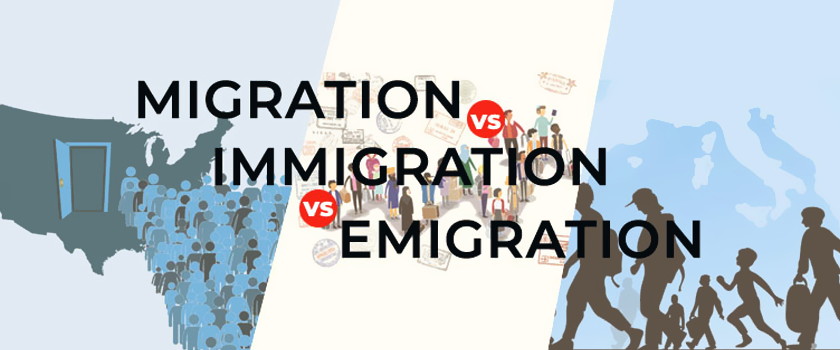We’re living in a globalized world. The wish to live a quality life is an aspiration that is universal, transcending cultures and borders. In fact, individuals from every field want improvement in various aspects of their life. This improvement could be in terms of economics, education, religion, and culture. In the context of this pursuit, terms like migration, emigration, and immigration become relevant. All of these terms are intricately related to the notion of movement.
Usually, people from developing countries move to developed ones in search of better opportunities. They make this arduous decision to improve their living standards, get their hands on greater possibilities, and have a brighter future. For this reason, you can see that many people today are leaving their homelands to move to Canada, America, and Australia. These developed countries are acknowledging the various potential benefits of having skilled and diverse resources. Therefore, they are making serious efforts to make their emigration and migration easy. With this facilitation, more and more individuals will be able to make their entry into developed nations. As a result, these developed countries will have the chance to utilize a broader talent pool in their quest to fuel innovation and economic growth.
What is Migration and Who are Migrants?
The term migrant is associated with the words immigrant and emigrant and it originated from Latin. The Latin word migrate means to move from one place to another and resulting in the formation of words like migrants and migrate.
You can use the word migration when you need to tell about the people who are moving to a new place and who don’t want to tell where they came from and where they are moving.
Migration is not about residing in a new place forever. For example, snowbirds that are living in Sweden but relocate to Texas in winter are called migrants. Birds are also migrants when they move to warmer places in the winter season.
What is Immigration and Who are Immigrants?
An immigrant is a person who moves to another country permanently and wants the nationality of that country. They leave their native country for better future opportunities immigration is the act of moving to another country.
The best way to remember this word is, to remember its prefix imim. Imim is derived from the Latin word which depicts that an immigrant is a person who comes into a new country. This word applies only to human beings.
What is Emigration and Who are Emigrants?
Emigration is the process of living in a region or country, so an emigrant is a person who leaves for another country. It is also a permanent move. Its prefix is e in the Latin language which means out of.
Emigration and Immigration
The interesting part is that a person can be an immigrant and an emigrant both. For Instance, when George moved from Texas to Sweden, he was an emigrant from Texas and an immigrant to Sweden.
The preposition changes the meanings of the words. An immigrant is going somewhere, and an emigrant is from somewhere. Although both words relate to movement, their accurate meaning lies in their application.
Simply put, emigration means leaving the country to settle in a foreign land permanently, and immigration means entering the country and settling there permanently.
Effects of Immigration
Immigrants are a great source of bringing economic, cultural, and social benefits to other countries. It has also resulted in the emergence of multicultural societies.
The USA is the state where people from all around the globe come to reside permanently. The number of people from different ethnicities has enriched the culture of the USA and that is why it is called a melting pot.
The immigration process is very lengthy and tedious, and it requires massive paperwork. One of the important requirements is that all the documents that are not in English need to be translated into English by certified translations.
Immigration is not only associated with citizenship, but it also gives social and human rights to the people. The borders of the countries are controlled by the states and the record of the people who migrated is kept. In 1999, the asylum and immigration law was given a final shape.
It allowed the people of the European Union to work and reside in any one of the countries of the European Union. The United States has a different process of immigration. It includes legal formalities regarding employment, family, and humanity.
Effects of Emigration
When people move to another country, spending on consumer products and the number of labor forces comes down. Your country will benefit from this if the labor market is oversaturated and it will lower the unemployment rate. On the other hand, if the situation is different, the people who are leaving the country cause brain drain. The country that is getting immigrants would be in a better position because they are getting competent resources that will enhance their productivity. Many countries have levied certain control over emigrants by initiating stringent rules and regulations.
Emigrants put a monetary impact on the receiving country. They can pay taxes as per their earnings and purchases. They can use all the social services like education and healthcare and all the social welfare services provided by the other country. Emigration has a great impact on the job market. The host country should have an equal number of jobs both for emigrants and native people.
Effects of Migration
Migration is the movement of people from one permanent home to another. People often have a choice to move, but sometimes, they are forced to move. The reason for leaving the place is called the push factor. The reason that attracts you to another place is called the pull factor. The benefits of migration are
- Decreasing the pressure on your economy.
- You can send money to your home.
- Migrants can learn new skills and work for their native country on their return.
- Migrants can take low pay on low-skill jobs.
Wrapping Up
Be careful in using all these three words because they have very little difference. Their improper use will change their meaning altogether, so you need to learn their difference in applications. For covering all the formalities of Migration, Emigration, and Immigration, it is necessary that all the traveling documents are in the native language of the country.



